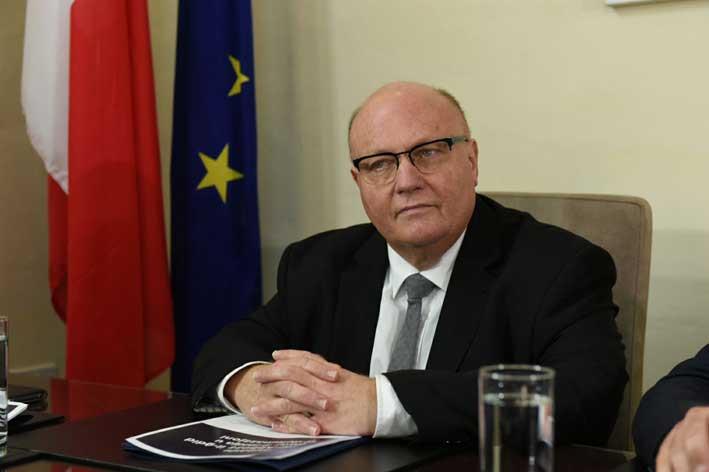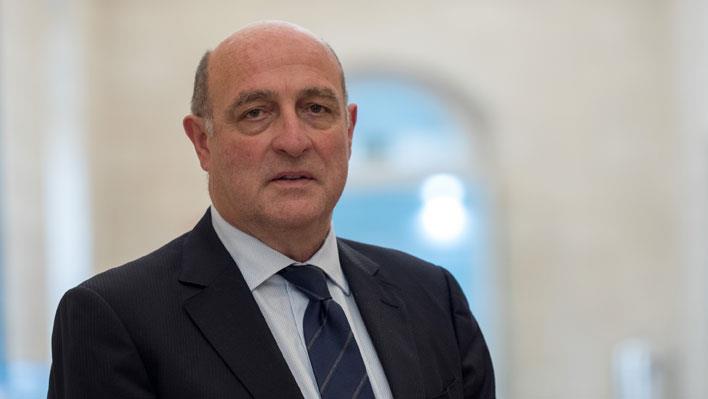During your term as president of the Chamber of Advocates, we saw change in the way magistrates and judges are appointed. Are you satisfied?
The Chamber had started a campaign to encourage the government to relinquish its exclusive power to select and appoint members of the judiciary. I think the campaign was successful in part and I am, to a certain extent, satisfied. However, we did not manage to persuade the government to divest itself altogether of this right it has held since our new Constitution following Independence, but we did manage to bring about changes to the Constitution and have the Judicial Appointments Committee set up. This committee vets applications by persons interested in being appointed to the judiciary and makes the necessary assessment of competence and suitability of the candidate who submits an expression of interest and makes its recommendations to the Minister for Justice. The decision whether the candidate will be nominated or not remains the prerogative of the Executive. This is a step in the right direction but, admittedly, falls short of what the Chamber thinks should be the correct method of appointment.
Do you think it was correct that in the last 25 years people with political baggage or a political background were appointed magistrates or judges?
In a country such as ours, it is practically impossible to find candidates who have no political background whatsoever. Having a political background does not necessarily constitute baggage. I think it is more a case of perception and how one would have conducted oneself when involved in politics. Having said that, I have absolutely no problem with the appointment of members of the judiciary who have held strong political beliefs and who militated in one party or another. I do appreciate that this is quite a controversial opinion and that it is probably best to avoid such situations. But history has shown that, when people are appointed to the bench, they abandon their past political allegiance, they rise above it and live up to their new responsibility. I have no problem with the way members of the judiciary coming from the political arena had conducted themselves.

Almost four years have passed since you were elected president of the Chamber. Is there anything that you wished to implement and did not have time to?
When I was elected, I set myself three targets; the first was the reform of the method of appointment of members of the judiciary, the second, the enactment of the Lawyers’ Act, and the third, raising the standards of the profession. The first target has been reached, in part. It is up to my successors to continue the task of pushing for further reforms. The Lawyers’ Act still has to be enacted but we have made significant inroads and I now have full confidence that this will be implemented since I have all the assurance from the government and other stakeholders regarding its implementation. I was not prepared to leave the Chamber and take up the post of Commissioner for Standards in Public Life unless I knew that this law would be enacted.
As regards the raising of standards of the profession, we have taken a number of initiatives and gone public on issues that, in our view, affect adversely the trust the public has in the legal profession. The issue of the two graduates with a criminal record is a case in point. That incident served to illustrate how the Chamber has the interest of the profession and of the public at heart.
Another measure that the Chamber should consider in the near future is to introduce psychometric tests before lawyers are allowed to practise. The warrant serves as the state’s guarantee that the individual does not only possess the academic qualification (that is given by the University degree) but that the person can be trusted. Everybody should have the opportunity to obtain an academic qualification but not everyone should be allowed to practice. I feel very strongly about this. The state should not issue a certificate of reliability to someone who is not trustworthy for one reason or another. That is tantamount to the issue of a false certificate.

Why was the Lawyers Act so important to the extent that you would not accept the new post before being given assurances that it would be implemented?
The Chamber has been actively campaigning for the enactment of the lawyers’ act for at least ten years. It is important both for the county and the legal profession to retain credibility and for people to trust lawyers. It is ironic that it is the Chamber that is campaigning for this law. One would normally have expected the government to insist on such legislation in the interest of the public in general. At the moment, the profession is not regulated other than in cases of breach of ethics. Take the regulation of law firms as an example. Today, they are completely unregulated; some claim to be partnerships when they are not, or that they are made up of a number of partners when it is not necessarily true. Also, it is time to change our view as to who can provide certain types of legal services. As the law stands only lawyers can give legal advice when we all know that certain other professions are just as qualified to do so.
Do all members of the Chamber agree with the Lawyers Act?
You always have exceptions and you will always have lawyers who would prefer to be unregulated. But the majority agree with this and certainly all lawyers who appreciate the importance of strengthening the profession and its credibility.
If the Lawyers Act were in place, would we have avoided the incident of the two law students who have a past conviction and whether they qualified for a warrant?
The present structures should have catered for this situation. The Lawyers Act may not necessarily have had any impact on their approval since the warrant shall remain the responsibility of the State. What the act would do is to give the Chamber of Advocates more power to monitor the activity following the grant of the warrant.

In the past years, doubts and concern were raised regarding the role of the Attorney General (AG). Are these concerns justified?
The role of the AG is quite ambiguous because while the AG works autonomously of government, it is also the government’s lawyer at the same time. I think, and this is my view and certainly the Chamber’s view, that we have reached a stage in our development where the AG should not occupy these two roles simultaneously. They should be distinct from each other; the issue of the office of the prosecutor which is on the cards will split the role of the AG. I think that would be another step forward.
Are you satisfied with the work done by the Ministry for Justice?
I think that on the whole the current Ministry has performed well. The Justice Ministry has introduced a number of improvements to court facilities and took steps to address the backlog of cases, by for instance introducing court attorneys to assist judges in drafting judgements. It has also done well to increase the conditions of employment of members of the judiciary. This was long overdue. In my last speech at the opening of the forensic year, I raised the issue that despite the increase of the court attorneys, the number of judgments that are being given is lower than the number given before their appointment. I asked how this could be the case and why this is happening. There might be a valid reason but somebody has to raise this issue since the numbers do not add up. You cannot have court attorneys appointed to assist judges and the output instead of increasing is reduced.

Concretely, what will your role as Commissioner for Standards in Public Life entail?
I will be sworn in on 12th November and until then I do not think I should be speaking about my role especially since this is a first and we do not have the benefit of experience. All I can say is that I will be what could be called the parliamentary watchdog. I am appointed to look into breaches by Members of Parliament and persons appointed in positions of trust in Ministries. My job will be to scrutinise their behaviour, check if a breach of ethics has occurred, examine their declarations of income, issue guidelines, etc. Basically, we will be looking at what happened in other countries and learn from their experience. We do not need to reinvent the wheel. We need to ensure that parliamentarians and persons of trust are accountable in terms of behaviour, because these people are now subject to scrutiny by not only the media and the general public but now also by this new office.
One of your jobs as Commissioner for Standards is to scrutinise the declaration of assets. Would you consider asking MPs to start declaring the assets of their spouses/partners as well?
I still have to form an opinion on this. All I can say is that the Commissioner has the power to investigate and ensure that the declarations made are correct. This would include the right to ask for income tax returns of anybody related or connected with the person making the declaration.
As Commissioner, will you be looking into past cases and, if yes, how backwards will you be going?
No, I shall not be doing so. The law prohibits me from investigating anything that occurred before the coming into force of the law on 30th October 2018. My work effectively starts on the day I take oath.
Will you be resigning from your legal firm?
Yes, I have already done so. I have given up my interests in the legal firm and all the companies I was involved in as director and/or company secretary, I have resigned from my position as Chairman of the Malta Arbitration Centre, President of the Chamber of Advocates and my term as Non-Resident High Commissioner to South Africa has come to an end. Basically, I resigned from all positions that I held.